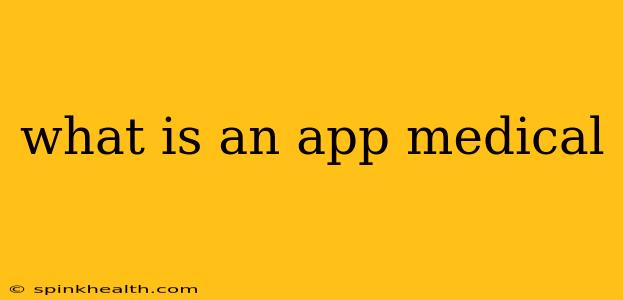What is a Medical App? A Deep Dive into the World of Mobile Healthcare
The world of healthcare is undergoing a digital revolution, and at the heart of this transformation are medical apps. But what exactly is a medical app? It's not a single thing, but rather a vast and diverse category encompassing a wide array of tools designed to improve various aspects of healthcare delivery and patient well-being. Think of it like this: just as there are countless apps for entertainment, productivity, and communication, there's a growing ecosystem of apps dedicated to helping us manage our health.
Let's explore this exciting world and answer some common questions people have about medical apps.
What types of medical apps are there?
Medical apps aren't a one-size-fits-all solution. They cater to a broad spectrum of needs, and can be broadly categorized into several types:
-
Patient Monitoring Apps: These apps allow users to track vital signs, such as heart rate, blood pressure, and blood sugar levels. Some even integrate with wearable devices to automate data collection, providing a comprehensive picture of an individual's health over time. This data can be invaluable for both patients and their healthcare providers.
-
Medication Management Apps: Keeping track of multiple medications, dosages, and refill schedules can be challenging. Medication management apps simplify this process by providing reminders, tracking medication adherence, and even allowing users to interact with their pharmacists.
-
Mental Health Apps: Addressing the growing need for accessible mental healthcare, these apps offer guided meditations, cognitive behavioral therapy (CBT) techniques, and tools to track mood and symptoms. They can be a valuable resource for individuals seeking support and coping strategies.
-
Telemedicine Apps: Telemedicine apps are revolutionizing healthcare access. They allow patients to consult with doctors remotely via video calls, eliminating the need for in-person visits, especially convenient for those in rural areas or with mobility limitations.
-
Fitness and Wellness Apps: While not strictly "medical," these apps play a crucial role in promoting healthy lifestyles. They track activity levels, calories burned, sleep patterns, and more, empowering users to make informed decisions about their health and well-being.
-
Disease Management Apps: These apps provide information and support for individuals managing specific chronic conditions, such as diabetes, asthma, or heart disease. They offer tools for tracking symptoms, managing medications, and connecting with support communities.
-
Medical Reference Apps: These apps offer a wealth of information on medical conditions, treatments, and medications. However, it’s crucial to remember that they should not replace advice from qualified medical professionals.
Are medical apps safe and secure?
The safety and security of medical apps are paramount. Reputable app developers prioritize data privacy and security, employing robust measures to protect sensitive patient information. However, it's essential to be discerning when choosing a medical app. Look for apps that:
- Are developed by reputable companies or healthcare providers.
- Have clear privacy policies.
- Utilize encryption to protect data.
- Have positive reviews and ratings.
How accurate are medical apps?
The accuracy of medical apps varies depending on the app and its purpose. Apps that rely on data from wearable devices might have varying degrees of accuracy depending on the device itself and individual factors. It's important to remember that medical apps should be used as supplementary tools, not replacements for professional medical advice. Always consult with your doctor or other healthcare provider before making any decisions about your health based on information from an app.
Do all medical apps require a subscription?
No, not all medical apps require a subscription. Some offer basic features for free, while others offer premium features for a subscription fee. It’s important to check the app's pricing model before downloading it.
How do I find reputable medical apps?
Finding reputable medical apps requires careful research. Look for apps recommended by healthcare professionals, check reviews on app stores, and verify the developer's credentials. Remember, your health is important, so choosing the right apps is a critical step in managing your well-being effectively.
In conclusion, medical apps are transforming healthcare, offering convenient, accessible, and personalized tools for managing our health. While they provide significant benefits, it's crucial to use them responsibly, remembering they are tools to supplement, not replace, professional medical care. Always consult your doctor before making any health decisions based on information from a medical app.

